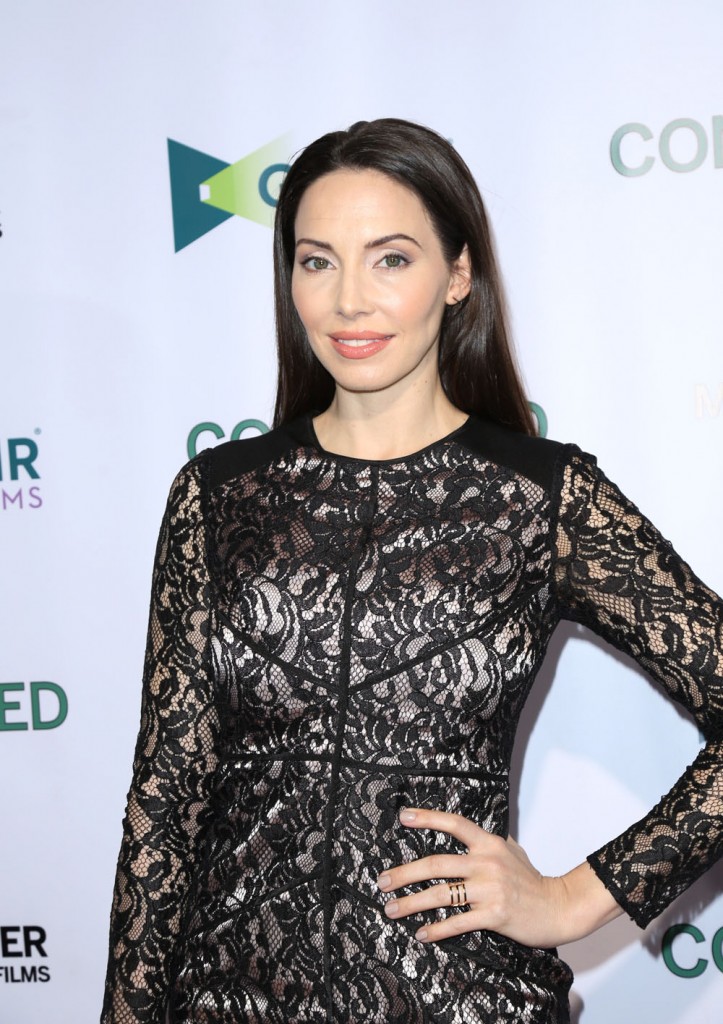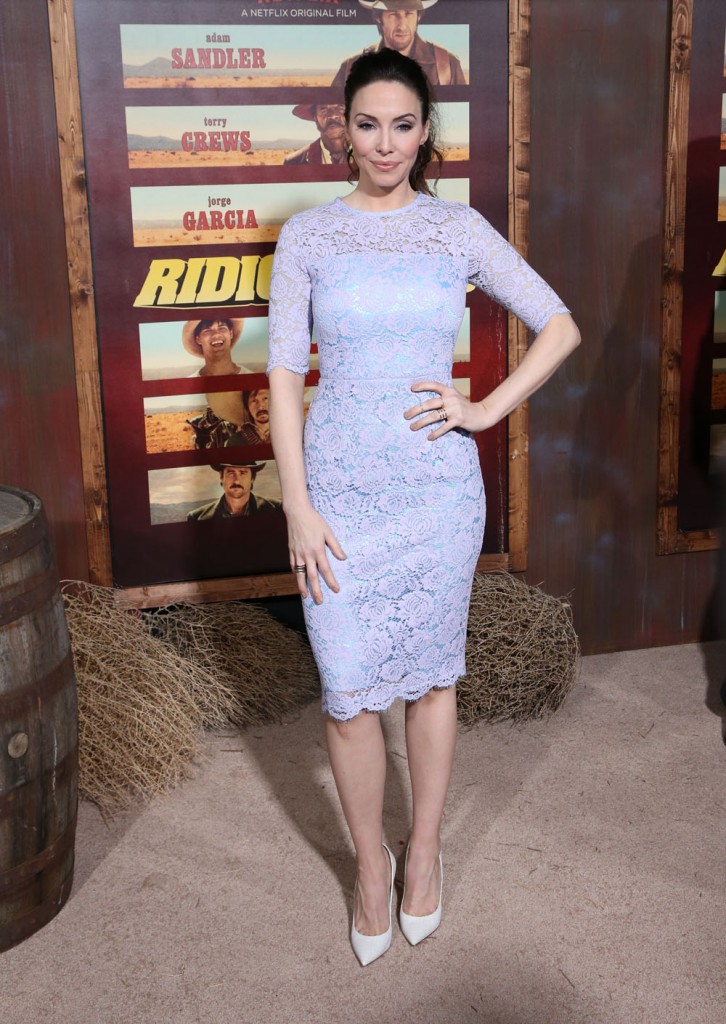
Comedian Whitney Cummings, allegedly 33, has a new essay for Lenny, Lena Dunham’s email newsletter, about her treatment for and ongoing recovery from codependency. From what I understand, codependency is an AA/Al-Anon term but it does have roots in mainstream psychology. In no way would I want to diminish what she said, which was heartfelt, open and kind of moving. I just wonder if a therapist would call it “codependency” or “dependent personality disorder,” not that it matters. Whitney went through some sh*t as a kid and she’s trying to make sense of that, and her maladaptive coping mechanisms, through the lens of Al-Anon. Her piece for Lenny was funny, sad and yet hopeful. I don’t want to oversell it and I’ve never been a fan of hers, but I appreciated how she kind of laid it all out for the reader. I’ll excerpt the main points below and to read more you can subscribe to Lenny before next week.
I couldn’t say no to save my life. I even found myself in sexual situations I had no interest in. I’ve slept with people because “they drove all this way.” My vocabulary was littered with obligatory phrases like “I have to” and “I’ll just swing by for an hour.” I routinely sabotaged relationships with my seeming altruism. Let’s just say I’ve purchased more than one custom gift with a boyfriend’s favorite NFL team’s logo on it from Etsy. After a breakup, my take was always “I loved him too much.”
But it was very hard to convince me that I wasn’t just, like, an amazing person. I buy so many Diptyque candles for people! How can I possibly have a problem? In recovery, I learned that the difference between codependence and being nice is motives. Essentially, if I drive you to the airport because you can’t afford a taxi and I expect nothing in return, that’s benevolent. But if I drive you to the airport secretly hoping you’ll like me, owe me, won’t abandon me down the line, or to control your perception of me (i.e., I want you to think I’m nice), that’s codependent.
I had always had a hunch something was wrong because I could give but I couldn’t receive. I could give someone nice jewelry, but when they tried to buy me a two-dollar coffee I would resist to the point of it getting awkward. And if someone gave me a gift, I viewed it like a grenade. I would have to wait until you left to open it because I was so worried I wouldn’t receive it well enough. My dear friend Beth gave me necklaces with my dogs’ initials on them, and I stressed out that she didn’t know how much I love them. I’ll Instagram them looking resplendent under the Nashville filter and tag her, send her photos of me wearing them so she didn’t think I was lying, and yet I still felt a pang of guilt that I didn’t deserve such kindness.
When I started going to [Al-Anon] meetings, every time I heard someone share, I related so much it felt like they had hacked my e-mails, or at least my Amazon account. I learned that as a codependent, I give too much so the scorecard is uneven in order to subconsciously re-create my childhood circumstances of feeling victimized and invisible. I.e., if you’re not going to make me feel bad, I’m going to be so nice to you that in comparison, you seem like you’re an asshole. GOTCHA!
My role growing up was the peacekeeper. My home was stressful, and putting out fires was the only way I could feel seen and like I had a modicum of control amid the emotional pandemonium. When my parents fought, I would put on improvised performances or fashion shows in our living room to try to distract them. Fussing over narcissistic people was how I kept in their good graces and how I felt safe. Worrying about other people’s problems (or perceived problems) was a habit I developed very early on. It worked as a child, but once I grew up, this coping device was a weapon I kept using even though I was no longer at war.
After being in recovery for codependence, I still get to be nice, but my motives have had to change. Today, my struggle is to do only 50 percent in my relationships. That may sound weird to some people, but my default is to do about 90. I once heard a woman struggling with codependence share her goals for the holidays: “This year, I am going to do half of everything I think I should do: half the cooking, half the gift-buying, half the party-going.” That sounds pretty simple, but for someone whose self-worth is contingent on others’ approval, it’s climbing Mount Everest.
Recovery is not without its cataclysmic life changes. I lost some friends who preferred me when I was a doormat. As my friend Kevin says, “When you get healthy, the sick get angry.” I still panic that mitigating my codependent impulses will make me less successful professionally, since needing people’s approval is historically what propelled me to work so hard. If I actually had self-esteem, would I ever work as hard again? The answer is no, but that’s OK.
[From Lenny, received via e-mail]
That was brave. I know Whitney isn’t most people’s cup of tea, she’s not really mine and I think Two Broke Girls is an awful show, but she can take that kind of criticism now. I can’t really relate to this – I’m not one of those people who can’t be alone and I don’t bend over backwards for anyone. There’s something admirable about Whitney admitting that she had a problem, that she’s addressing it, and that it has affected her entire life to a difficult degree. Not many celebrities would be so honest with their toughest personal issue.
The last gossip we heard about Whitney was that she was dating her former Whitney show co-star, Chris D’Elia. In Touch reports that the two were seen making out at a restaurant. She has him on her social media so it could be happening, but she was also a guest on his show Undateable Live on NBC, with her episode airing last Friday.
Another live show at 8pm! #undateablelive please send me insults for @chrisdelia pic.twitter.com/22EGi22epm
— Whitney Cummings (@WhitneyCummings) December 5, 2015
the vampire twins are back together on #undateablelive 8pm on NBC. Don't tell NBC I'm on or else they'll cancel it pic.twitter.com/oljTOFw3vs
— Whitney Cummings (@WhitneyCummings) December 4, 2015
photo credit: WENN.com and Twitter/Whitney Cummings


















I don’t know who she is, but I appreciated the article. I think we all carrying survival mechanisms from childhood into adulthood when we no longer need them, but they are just so deeply ingrained in us that we don’t even know we’re doing it. Mine was to never have negative emotions, because that was considered “sulking” in our family. I was so afraid that people would stop being my friend if I ever got angry or expressed disapproval of something they said or did.
We never escape our childhood-it’s true.
I dated a guy who grew up never being allowed to properly express himself as a child–he was expected to be calm/happy/placid at all times. The result was an adult who was left with no ability to process or cope with real emotions. He simply didn’t have the tools. So he repressed those emotions and when they eventually resurfaced, they manifested in a really unhealthy, passive/aggressive way. I always felt bad for him actually…
I really appreciated what Cummings wrote here.
Kitten, Oh my! That sounds a bit like myself. I didn’t even recognize it until my husband pointed it out a few years into marriage. I couldn’t even accept it because “Everybody should appreciate how ‘happy’ I am!” It’s something I still struggle with, but I am aware of it and I really try to be more honest in my expression of my emotions.
I too appreciate WC essay.
Yes,to both of you, it’s a lot of work to overcome the inability to express anger or frustration. Mine turned to depression, and although I have gotten much better at expressing my emotions, I still struggle with the depression, and probably always will.
I don’t get this article’s skepticism over her saying she’s co-dependent.
She didn’t SAY one or both parents drank, but I’d guess it might be true, because it goes hand-in-hand with them fighting all the time. And if she’s in an ANONYMOUS program she may not be telling it all.
Cause it’s, you know, ANONYMOUS.
The dynamics of alcoholism are all about secrets and shame, and those happen with abuse, domestic violence, and other situations. People pleasers are just those of us who learn to keep the peace amid chaos.
Lots of people critique 12-step programs when they’re ignorant of specifics and just guessing what they’re talking about. It gets tiresome.
Sometimes those who resist 12-step ideas the most are the ones who are the most threatened by them cause it hits too close to home.
Too true. Mine was to front that nothing bothers me because I was told I was too sensitive; a cry-baby and that I should get thicker skin.
Also, like Whitney and a lot of women, I was (and still am sometimes) easily guilted into doing things I didn’t want to do because I’m a nice person and I didn’t want to disappoint or displease anyone.
ack! this is a good reminder, particularly this time of year when patience is often in short supply, to give my kids a break when they’re upset and just let them be upset. thx
Yep.
As a woman I should always please people.
Some people found out that I do also have an unbelieveably stubborn streak and that I don’t mind if I p**s off some people.
Oh, and VENGEFULNESS.
Me Scorpio.
Most find out when its too late.
Hehe. ;DDD
I have never watched her show but read this post because she sounded like me. Reading her entire article was very eye-opening. I really appreciate this information she is sharing. I can see how in a way this applies to other women I know as we have been programmed to be self-sacrificing.
I’ve always been a big fan of Whitney’s.
Her essay really moved me. It is s interesting how your chaotic childhood circumstances and coping mechanisms can inform who you are all the way into adulthood.
Into adulthood and beyond. I think some people (me) have to reach a crisis in their life or relationships to finally examine what they are doing and why. I was in my thirties before I realized the connection between my fear of being abandoned or not loved for expressing “negative” emotions was about the way I was raised. Even the most well- intentioned parents can leave their baggage on your doorstep.
I like her, and am on record for liking 2 Broke Girls for a range of reasons. I think her essay is timely (time of year) and you can feel the truth in it. My parents did a bit of a head game on me (i was responsible for every bad thing in their lives even before i was born, and should solve things for them by age 8, and also give them money forever, etc) and it took the mother of a friend during my mid 20s to wake me up out of that kind of “war” and that kind of “guilt” — so I hope her words act like those of a friend to someone today.
Re 2Broke…. Look at it also between the lines.
Liberty, I like her too and actually think 2 Broke Girls is hilarious. I heard a friend say that it was a female version of Two and a Half Men, but I couldn’t disagree more. The jokes are actually very clever a lot of the time, with a lot of hidden meaning which you pick up on when you have watched a few episodes.
I think a lot of people can relate to this, especially women. The part about sleeping about people because they drove far? Made me super uncomfortable because I remember feeling guilty refusing to sleep with people because they had driven me home. So ridiculous.
Me too. So much… that one sentence really stuck with me.
This reminds me of why the Friend Zone shit always pisses me off. As if we have some obligation to be romantically interested in a guy just because they’re interested in us. But that perceived duty to reciprocate is so common among women it seems.
So true! We are taught to be pleasing, accommodating, etc… This actually reminded me of Jennifer Lawrence’s essay recently where she talked about just saying yes & not fighting for things in the worry that she would be seen as difficult or (gasp) the b-word. I really liked this essay a lot & wasn’t expecting to. It rings so true.
I’m not familiar with her but I found this interesting and thought provoking. Although I’d always assumed co-dependent behavior/tendencies generally are a manifestation of underlying anxiety or depression (it sure was in my case), I’ve never thought of it as a “stand alone” disorder.
I’d never thought of codependency outside the context of alcohol/drug dependence. I thought there had to be an addict involved for there to be a codependent.
I’ve also heard of codependency developing in situations where there is a “rage-a-holic” in the family . This can be an unpredictable, dominating, yelling, critical, demanding person whom everyone tries to placate to keep the peace rather than confronting the behavior and risk an onslaught of rage. It doesn’t necessarily have to be an addict/alcoholic.
Agree on both those scenarios but I also know of codependent situations that occur simply because the one person is afraid to be alone, even if the partner doesn’t have substance abuse or anger issues.
My older brother and sister are addicts. I remember thinking as a child that God gave me to my mom and dad to make up for my brother and sister. So I’ve always sought validation/approval from someone else. I can totally relate to what Whitney said. I guess I just never thought to label it codependency. Not that it really matters – whatever it is it isn’t healthy and I’m working on it – but I’m not sure that label fits.
@Breakfast: Yep. My husband used to be like this and everyone in his life tries to placate him. As a result my entire life was engineered to simply avoid a negative reaction from him. Going completely out of my way, doing SO MUCH to keep our household ticking including cooking, looking after the kids plus working a demanding full time job, all just for his approval and the avoidance of conflict. When our issues reached their peak and our relationship was destined to come to an end, he realised that his behaviour needed to change and it did; however, I was so traumatised by the experience (without realising it while it was happening) that it was an emotional struggle for me to adjust my behaviour and lifestyle accordingly.
Size does matter- codependency comes in a lot of shapes or forms. There are the rebels, and the people pleases.
Codependent gets thrown around a lot as meaning people who can’t be alone, but that is not really what it is about, and many codependents have no issue spending time alone. In fact, many withdraw quite a bit.
It is an interesting disease, because it comes in so many forms. A lot of people realize they might have it, Get in a relationship with someone with an opposite personality, only to realize they are both very much codependent.
“This coping device was a weapon I kept using even though I was no longer at war”……
This is such a profound thing for her to have realized about herself.
Agreed. Everything she says in her open letter is really introspective actually. She’s obviously reached a break-through–a deeper understanding of herself and I applaud her for that.
I agree completely.
When we were younger we all my siblings and I had to always behave in the perfect manner, my parents were seen as one of the ” pillars of society” and the pressures that came with that were incredible. My older sister was and still is an Alpha female and I was second, I always had to accomadate for her ego.
Into young teens and adulthood I couldn’t express myself properly ( similar to a posters ex above) which led to not thinking I had anything worthy to say then lost self confidence. I used to latch on to my sister as she was the confident, outgoing and expressive. It took it me a long time to come into my own.
Side note: she’s 33? I thought she was in her early 40’s.
An interesting piece, and I respect her for choosing to share it.
Her comedy is not really my thing. But I like her for saying this and I liked what she said about gaining weight, too. She’s smart.
I love this. I’m so impressed that someone can not only recognize all of these issues within themselves, but also be so brave as to put it out there for everyone to see. Especially when it will inevitably lead to criticism and one of the symptoms of her issues is a crippling need to be liked. Also, I think it’s adorable if it’s true that she and Chris are dating. A while back on his show, the cast was talking about regrets and he just blurted out of nowhere that his biggest was not hooking up with her when he had the chance. He had obviously ad-libbed it and everyone gasped before cracking up.
I really enjoyed her show “Whitney.” She and Chris had chemistry on the show.
I enjoyed her show while it was on-her comedic taste definitely takes some getting used to. I can identify up to a point-most women of a certain age were taught growing up to be nice almost to a fault. It is liberating to learn to say “no”- in a polite way, of course!😃
“Comedian Whitney Cummings, allegedly 33”
LOL
Thanks for the laugh my boss is being a d*ckhead this morning.
This reminds me a lot of my best friend, who was abused as a kid. She has a script in her head of how a great friend must act, but as she has gotten older she has realized that she gives way too much. It is counterproductive, she gives way, way more than people want or expect, and then feels let down that people don’t reciprocate. My parents fought a ton growing up, so I definitely developed the peacekeeper/diplomat personality but despite that I felt safe and loved, so co-dependency was never my thing.
Good for her. But. Her face looks super tweaked. The last time I saw her, I thought she looked more natural.
I really dont know what to say about this article….. i supported someone (family) who is a total codependent… so much so they drove in a raging storm and almost died in the charleston sc flooding to be near someone (another family member) because they were merely crying on the phone…
at the time i just thought…. omg no just thihnk about what your about to do…. then I realized they just need help…. and its hard being the person watching or trying to be there for a co-dependent…. i’ve cried enough about it….. I feel as though the codependent person I am supporting has spent her whole life as that…. since she saw something in her childhood that is to say the least highly disturbing…. and she is trying to mold me into a codependent of the madness and maybe I am slightly co-dependent on her shenanigans…. but i find myself getting upset or sad when i try to put my foot down…. its too much for this….
anyways…. i initially wanted to say this essay seems like….. Whitney just work it out in your mind…. but I dont know what she saw in childhood…. and from that stems a lot of codependent issues….. so while when reading her article i thought….. this is no big deal….. i think of the person who I am a supporting emotionally and think NO YOU DEFINITELY NEED THERAPY
I don’t know why, but I kind of ship Cummings and D’Elia as a couple. Maybe it’s because I had just started to get comfortable with their roles as TV couple right before their show was cut. I remember watching it awkwardly the first few times because her insecurities came right through in her character. Whatever the case, I hope things work out and she finds some peace and happiness.
This essay actually sheds some light on a relationship I had with a friend. I actually had to end the friendship after many years of her acting exactly like this. And I’m sure she sees it like I took advantage of her generosity but I could not handle all the gifts while she had no money, all the sense that I owed her but I couldn’t give her anything in return and then all the text messages and emails where she analysied everything she said or my reactions. She also grew up in an alcoholic home and by the end of our friendship was one as well. I still feel guilty that I couldn’t get her to realize I was her friend without having to be bought. I was the most emotionally draining relationship of my life.
I have a friend just like that, whom I have had to retreat from because she made me feel like an a-hole when I wouldn’t invite her on my vacations! She would pout and feel hurt, and I would spend so much time apologizing. We were long-distance friends, and she actually relocated to my town when her husband had to go overseas to a dangerous area, so she could be near a friend. It was a disaster having her under my nose all the time. I’m her kids’ god-mother, but she finally quit talking with me 2 yrs ago because “it hurts too much to be friends with you.” We are a little better now that she has actually gotten new friends through her kids’ school and all the volunteering she does, which of course she wants a freaking parade for on a daily basis. She is exhausting!
I just extricated myself from a relationship with a codependent personality. Gifts, cards, books, clothing, etc. But to listen to the long winded analyzing of every tiny thing was draining. I finally said “I am not able to help you since I am not a professional. Perhaps you need to talk to someone professional who can help you”. I then stopped returning emails. I just could not take it.
She used to go out with director Peter Berg and he was an incredible dick to her. I remember hearing her on Howard Stern crying how Peter was such a great guy and Howard asked her if Peter is so great, why are you crying hysterically? It sounded like she was trying to put a front. Maybe that who she felt so co-dependent.
I remember that interview as well but especially the part where she was completely inappropriate at Jerry Seinfeld’s party. She took off her underwear& rubbed herself on their white sofa & threw glasses at Jessica (who confirmed it on WWHL)
Clearly she had issues then. Hope she is better
It’s not an AA/Al-Anon term, even if it’s evident in many addiction scenarios. . They actually get pissy if you throw that word around in meetings as it’s a clinical term. Also, addiction does not need to be present for codependent relationships. Codependency simply means your sense of well-being is derived through the perceived comfort of someone else.
A lot of parental relationships are codependent. They go far beyond typical parental obligations. For example, my relatives that let their 40-something son, his wife and their children live with them. Because God forbid those two grown ass people could survive on their own. It’s really gross. But the guilt my relatives feel towards their child is overwhelming.
I feel a little bit like I’m missing something – how did she end up at Al-Anon? One doesn’t just decide to try that instead of therapy, and I’m fairly certain they frown on you using it in place of therapy if you’re not struggling with alcohol dependency (your own or someone else’s).
I’m guessing that she did have someone in her life that is an alcoholic & she’s choosing not to out them. A parent or boyfriend…
She has openly talked about her sister’s drug and alcohol issues in the past.
Al-Anon provides support to people who’ve been affected by others’ addiction issues. ACOA, Adult Children of Alcoholics, is a very real issue and leads to a messed-up adulthood, even for kids who seemed all fine & ‘normal’ growing up.
Yes, I know. My point is that she’s not talking about going to Al-Anon in that context either. There’s a world of difference between ‘I’m screwed up because my parents were dysfunctional’ (which is what she says in the article) and ‘I’m screwed up because my parent(s) are alcoholics’
@Bridget I see your point – I should have also mentioned that ACOA opens themselves up to adults who come from dysfunctional families, period…basically if you identify (as I do) with the train-wreck list of characteristics, then you are welcomed with open arms.
It’s a very inclusive approach which is a godsend for anyone who’s been affected by a dysfunctional family. It’s also good because “functioning alcoholics” fly under the traditional radar but destroy families just as much…so being inclusive is additionally helpful for adults who grew up with that, and haven’t yet connected the signs of alcoholism.
OK, I identified with every line of this. 🙁 I knew something was wrong with me. I just didn’t know its name. 🙁 Well, if she helps no one else with this, she just helped me.
@Amy Tennant it’s very unsettling to realize for the first time, I’m still going through it. The good thing is once you’ve seen the pattern, you’ve already made huge leaps on a new healthy journey and new life.
I also realized I’ve had a life-long tolerance for people with non-obvious substance abuse, and anger issues, courtesy of a “functioning alcoholic” parent who didn’t seem like an alcoholic but brought all the same chaos anyway. I’d suggest you might look into ACOA Adult Children of Alcoholics, you might see yourself listed in the common traits & habits.
Bless her heart. I was raised in complete chaos & parents with addictions. I am her. In the past 5 years, as I’ve been making changes so I am happy – I lost 98% of all my friends. Including a nephew & brother. (both addicts) Setting boundaries caused just as much pain for me as it did the people I no longer let use me, hoping they would like me.
It isn’t easy and I’ve cried more times than I can count – but the friends I have are real and aren’t interested in using me for every little thing I would give.
Hang in there. Healthy friends come along to replace the unhealthy ones over time.
@Celebitchy Absolutely what she describes is codependency; it is very distinct from “dependent personality disorder” and is almost worse, because you continue to ‘find yourself in’ unhealthy friendships & relationships, with people who take advantage of it. It definitely has its roots in childhood & learned behaviors and patterns…and tolerance for narcissists & bullies.
Whether you seek those people out or attract them or a mix of both…you end up with a lot of people in your life that those such as yourself, with a strong sense of self, would have shown to the door early on.
I completely relate to what Whitney talks about here. I grew up around narcissists and was codependent myself. very cool of her to come forward with this as i’m sure it will help others too